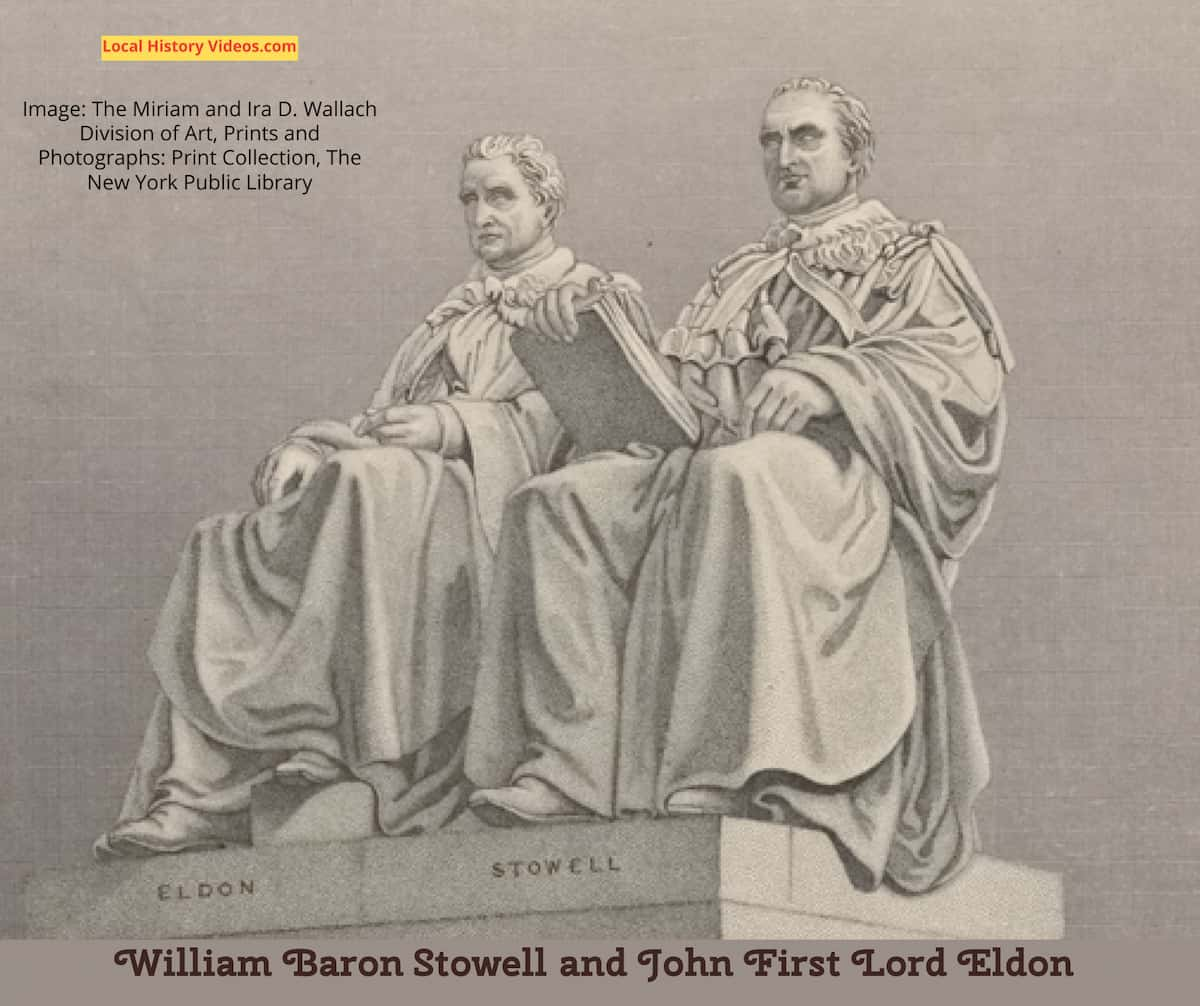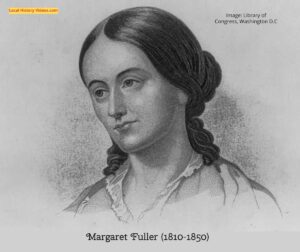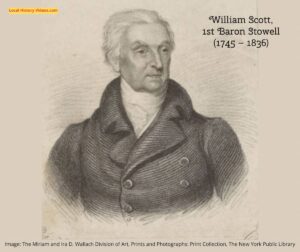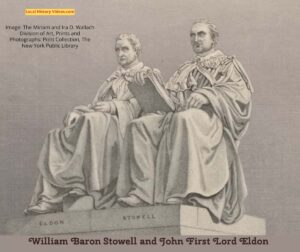Discover how John Scott, Earl of Eldon, rose from Love Lane in Newcastle upon Tyne in the 1770s, to Lord Chancellor of England in 1801.
This extract is from a book published by William Whellan & Co in 1855, called History, topography, and directory of Northumberland, comprising a general survey of the county, and a history of the town and county of Newcastle-upon-Tyne, with separate historical, statistical, and descriptive sketches of the boroughs of Gateshead and Berwick-upon-Tweed, and all the towns … wards, and manors. To which is subjoined a list of the seats of the nobility and gentry.
John Scott, Earl of Eldon, High Steward of the University of Oxford, a Governor of the Charterhouse, and a member of the Privy Council, D.C.L., F.R.S., and F.S.A., was born at his father’s house in Love Lane, Newcastle, on the 4th June, 1751.
John, who was the youngest of the family, like his brother William, was educated at the Grammar School of Newcastle, but at an early age he quitted it for the University of Oxford, where he matriculated, at University College, on May 15th, 1766, being then in his fifteenth year.
While there he received the assistance of his brother’s private and public tuition, and to such good account was it turned that in July, 1767, he was elected a fellow of his college.
He took the degree of B.A. in 1770, and in the following year gained the Chancellor’s prize of twenty guineas, for an English essay “On the Advantages and the Disadvantages of Foreign Travel.”
In 1773, Scott was admitted a student of the Middle Temple, but as yet he resided principally at Oxford, and in order to add to his income at that time, he took part in the tuition of University College, with his brother and Mr. Fisher, afterwards the master of the Charterhouse.
He also read lectures as deputy of the Vinerian Professor of Common Law, in the years 1774-1776.
He then applied himself exclusively to the study of the law — he was called to the bar in 1776, and within seven years after, received a silk gown.
In 1783 he obtained a seat in parliament for Weobly, through the Lord Chancellor Thurlow’s interest with Lord Weymouth.
In 1788 he was made Solicitor-general and knighted, and on the promotion of Sir Archibald Macdonald to the office of Chief Baron of the Exchequer, in February 1793, Sir John Scott was made Attorney-general.
Six years afterwards he was raised to the peerage by the title of Baron Eldon, and appointed Chief Justice of the Common Pleas, and in 1801, he became Lord Chancellor of England.
This important office he held till 1806, when Erskine succeeded him under the administration of “All the Talents.”
On the 1st. of April, 1807, he was re-appointed, and from this period he continued in office until April 30th, 1827, altogether nearly twenty-five years.
On his resignation in 1827, he received from George IV. a present of a superb silver vase as a token of respect, and in 1821, on the coronation of that king, he was promoted to the dignity of Viscount Encombe and Earl of Eldon.
For a few years after his resignation Lord Eldon continued to attend the House of Lords, and on important occasions he took part in the debates, occasionally with the vigour of his early days, but as old age increased, his attendance became less frequent, and domestic bereavements were added to infirmities.
The loss of his favourite son in 1832, was a severe blow, and the state of his brother, Lord Stowell, was a farther most bitter affliction.
At length in January, 1838, he expired from the effects of age, calmly and without pain, at his house, Hamilton Place, London, in the 87th year of his age.
You may also like
- Margaret Fuller, the American feminist writer who died in a shipwreckMargaret Fuller (1810-1850) was an influential American critic, teacher, and feminist writer, recognized for her contributions to American culture, particularly through her seminal work, Woman in the Nineteenth Century (1845). Born in Cambridgeport, Massachusetts, Fuller was a gifted child who pursued rigorous education despite limited access for women at the time, which impacted her health.
- Emanuel (Manny) Shinwell, 20th Century British PoliticianGlimpse history through old images of Emanuel Shinwell, a British politician who served in the Atlee postwar Labour cabinet.
- William Scott, Lord StowellWilliam Scott, Lord Stowell, was born during a Jacobite emergency in Newcastle, but rose to great heights in Oxford and London.
- The Reverend Hugh MoisesBack in the 1700s, the Reverend Hugh Moises was the Headmaster of a Newcastle school which nurtered many future eminent men.
- Charles Hutton, Coal Hewer to MathematicianDiscover the life of Newcastle’s Charles Hutton, once a coal hewer in the 1770s, who died a well respected mathematician.
- The Reverend Richard DawesThe Reverence Richard Dawes, headmaster of Newcastle’s Royal Grammar School, was included in a section about eminent men of Newcastle upon Tyne in a book published in 1855.
- John Scott, Earl of Eldon and Lord Chancellor of EnglandDiscover how John Scott, Earl of Eldon, rose from Love Lane in Newcastle upon Tyne in the 1770s, to Lord Chancellor of England in 1801. This extract is from a book published by William Whellan & Co in 1855, called History, topography, and directory of Northumberland, comprising a general survey of the county, and a… Read more: John Scott, Earl of Eldon and Lord Chancellor of England
- Vice-Admiral Lord Collingwood, Hero of TrafalgarVice-Admiral Lord Collingwood was one of the eminent men of Newcastle upon Tyne written about in a book published in 1855.
- The Reverend John BrandThe Reverend John Brand was a historian added as one of the eminent men of Newcastle upon Tyne in a book in 1855.
- The Reverend Henry BourneThe Reverend Henry Bourne was one of the eminent men of Newcastle upon Tyne whose life was described in a book published in the year 1855.






